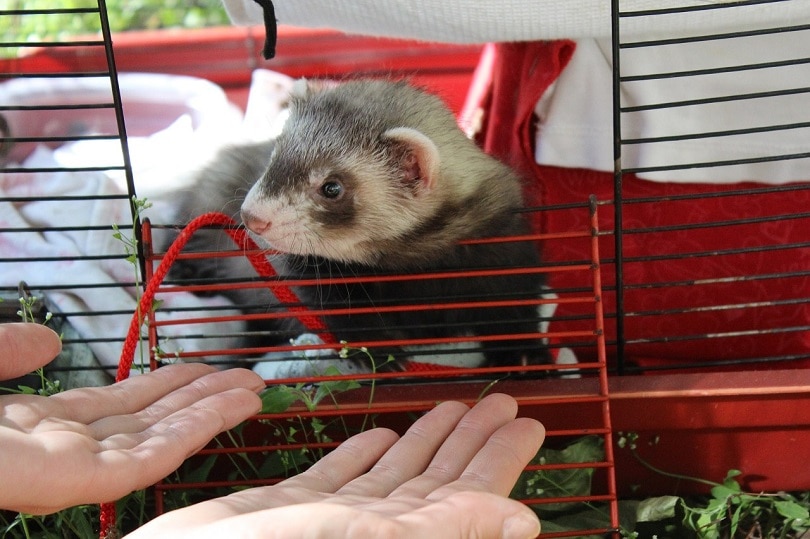
If you are looking for a pet that has a low chance of causing allergic reactions, you might have ventured into the world of “hypoallergenic” pets. But if you want to cuddle up with a little ball of fluff, which mammals are allergy-friendly? While the ferret is not hypoallergenic, they are a low-shedding animal. This small, mischievous, and funny mustelid will turn your life upside down. Let’s learn more about ferrets and what to expect when it comes to their beautiful coat and your allergies.
What Makes an Animal Hypoallergenic?
Every pet is a living being that can cause an allergic reaction in a person. It is impossible to find a pet you can be 100% sure won’t cause a reaction in any human. But what we can do is separate animals that are less likely to cause allergies, only manifesting as minimal or mild reactions. Those pets that are sometimes considered truly hypoallergenic have no fur or dander at all, like reptiles and fish (that said, they can cause allergic reactions in certain circumstances). But if your heart is set on a furry friend, then a ferret may be a good candidate if you’re not allergic to their fur, saliva, feces, urine, or dander.

What About Pet Hair Causes Allergies?
Pet hair is rarely an allergen on its own. In most instances of an allergic reaction, the person is allergic to certain proteins that an animal naturally produces. For example, the most common cat allergen that people are allergic to is a protein called Fel d1. This is mostly found in a cat’s saliva.
The concept of pet hair triggering an allergic reaction comes from the fact that as pets groom themselves, they deposit this allergen all over their body via saliva. It then disperses into the air as microscopic particles (known as dander). It can also attach to a pet’s hair, so shedding hair with the allergen will cause a reaction in someone who is affected by it. This means even hairless cats can cause allergies, as the allergen isn’t in their hair, but rather in their saliva.
Are Ferrets Allergy-Friendly?
Ferrets belong to the category of pets that don’t shed a lot. Their seasonal shedding happens only twice a year and lasts a couple of weeks. So, the amount of fur that they shed is much less than pets that shed throughout the entire year.
Despite this, ferret allergies are reported in literature, and it is entirely possible that you could be allergic to a ferret. Therefore, it is incorrect to say that a ferret is allergy-friendly. A person who is allergic to a ferret would definitely show signs of a reaction if they were in close contact with the animal.

How to Recognize an Allergy to Ferrets
The easiest way to ascertain whether you are allergic to a ferret is by asking your doctor to perform an allergy test on you. This commercially available test can specifically test for ferret allergies.
However, this test would only yield a positive result if you’ve been in contact with and exposed to ferrets in the past, as it would require your immune system to be primed with a potential allergen. Therefore, if you’ve never spent time with a ferret before, the test would yield a false negative.
Should You Expose Yourself to Test for an Allergy?
At times, people like to test themselves with a pet prior to adopting them, to ascertain whether they have an allergy to the pet. Since pets may shed different levels of allergens on an individual basis, this trick can work if you know that you have a manageable allergy and wish to assess your compatibility with an individual pet.
However, if you’re not sure if you’re allergic to a ferret and have never been in contact with one before, this technique will likely be unsuccessful. This is due to the way that your immune system works for a delayed allergic response. The first exposure usually produces no signs whatsoever. Repeated exposures are what trigger an allergic reaction.
Can You Live With a Ferret Allergy?
There is no simple answer to this question. It is vital to realize that the best course of action against an allergic reaction is to avoid the allergen altogether, as allergies can progressively get worse over time with repeated exposures.
Deciding to adopt a pet that you are allergic to is a controversial topic. Inherently, it will limit the amount of time and contact that you have with the pet. This will diminish both your experience of adopting a pet and your pet’s quality of life. Therefore, it isn’t recommended to adopt a pet in this circumstance, as it is not fair to you or the animal.
If you have a severe allergy to ferrets, it is best to not adopt a ferret. Even if your allergy seems manageable to you, you should still discuss this with your doctor before deciding on your next course of action.
You might not realize that you have an allergy to a ferret until after you’ve adopted them. In this scenario, you should seek the advice of your doctor. In the meantime, you might be able to lessen the severity of your allergic reaction by using the following tips.
The 6 Tips for Living With a Ferret Allergy
1. Stay Away From the Cage and Litter Box
If a person is allergic to ferret dander, saliva, or urine, that person should stay away from the cage and litter box because they are filled with all these things. Another family member (who doesn’t have allergies) should clean the cage, replace hammocks at least twice a week, and clean the litter box twice a day.
2. Clean Regularly
Outside of the cage, vacuum the areas where your ferret spends the majority of their time. But don’t just get the floors; you’ll need to clean the walls to about hip height and the furniture too. Ferrets walk on floors and climb on sofas and coffee tables.

3. Reduce the Number of Ferrets
The allergic reaction will be more severe if a person allergic to ferrets is surrounded by more ferrets. So, to keep the allergic reactions away or under control, you may need to rehome some (or all) your ferrets. That way, there will be less dandruff, saliva, or urine to cause an allergic reaction.
Remember that there is no long-term benefit to playing the role of an allergic martyr if you are indeed allergic to a ferret. Prioritizing your own health will ensure that you can properly care for yourself, your family, and any other pets that you own in the future.
4. Keep Ferrets Healthy
If a ferret is healthy, they will shed less and have less smelly pee and poop. You should feed high-quality, grain-free food to your ferret and stay on top of your routine veterinary visits to ensure that your pet is in good health.
5. Wash Your Hands After Handling Ferrets
Owning a ferret will result in some kind of interaction between a ferret and you, the owner. So, after you are done playing and cuddling the ferret, wash your hands to lower the chance of an allergic reaction. You can also remove clothes you had on to further reduce reactions.
6. Purify the Air
If a person has any type of allergies, an air purifier is a must-have addition to their home. That small machine will remove all the pollen, dust, dander, and other allergens from the air, which helps tremendously with allergic reactions. Besides that, it is good to air out every room in the home at least twice a day to bring fresh air in, no matter the allergies.

Conclusion
Like with many other pets, it is possible to be allergic to a ferret, and they aren’t considered hypoallergenic animals. If you are allergic to a ferret, you should seek medical advice before adopting one and follow your doctor’s lead on the matter.
If you happen to be cohabiting with a ferret and realize that you’re allergic to them, there are tips that you can utilize to minimize your reactions until you are able to develop a plan with your doctor. However, ultimately, the best course of action for an allergy is to avoid the allergen altogether.
Related Reads:
Featured Image Credit: Mitskevich Uladzimir, Shutterstock








